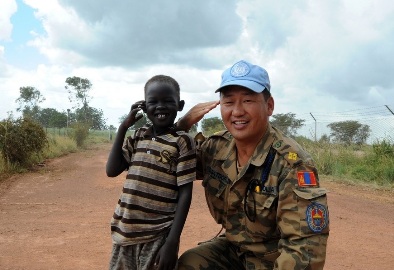South Sudan losing revenues to UN exemptions: officials
June 9, 2016 (JUBA) – South Sudan said it loses millions of money in revenues to taxes exemptions at the customs points along the borders in the country. United Nations and other humanitarian agencies have been “exploiting the generosity.”

“I can say 99% [ of exemptions] are going to UN, NGOs and Humanitarian agencies. So you can say whatever we collect monthly can be [half] by what goes on exemption,” said Akok, speaking at a reception organized in Juba on Wednesday for new Interior Minister, General Alfred Lado Gore.
He said the remaining “one percent of exemption goes to government agencies.”
South Sudan relies on oil revenues for up to 98% to fund its budget. But the 21 months of war and lowering oil prices has pushed the country to the verge of economic collapse and demands collecting taxes from non-oil sources. Customs duties are one such source.
Minister Gore said tax exemption should be narrowed to ensure that it is not exploited.
“All over the world, there are exemptions but we are too generous and people tend to abuse this generosity,” he said, speaking to senior customs officials in Juba.
He said anyone applying for customs exemptions should be scrutinized to ascertain the significance of the item being imported in order to minimize misuse of exemptions.
“They [people seeking exemption] bring all sorts of things, asked for exemption and the money just goes to the [UN] agencies, not the country of [origin],” said Gen. Gore, the minister without mentioning any UN agency by name.
There was no immediate response from UN and Humanitarian agencies. Some junior customs officials told Sudan Tribune that UN officials misused letters of exemption to import beverages and tobacco – items that taxed highly and not for humanitarian purposes.
Other agencies extend the exemption letters to companies importing fuel to South Sudan and therefore dodge taxes at the borders despite those companies being owned by businessmen.
One positive note, he said, is the likely reopening of South Sudan – Sudan border.
“They (Sudanese) have accepted the corridor; so this is where you people will now move to establish your offices because those are very important areas for trade, and within the next two weeks the four agreements will now be finalized so that we collect revenues from traders who will now move from there and here and this will add to your revenue collection,” he said.
CORRUPT OFFICIALS
But Minister Gore has another shortcoming – corruption. Nimule and Kaya – the two busiest crossing points from Uganda to South Sudan are not remitting taxes to Juba, Minister Gore said.
“I have just received a report that Nimule checkpoint has collapsed. The money there is going to individuals because they are connected with big people! Very big people who are untouchables,” said Gore, without giving names of the suspected “big people.”
He alleges that insignificant amount is remitted to government accounts and the officers take chunk of the revenues.
He said his ministry, which deploys senior customs officials to border points, will review promotion process to remove corrupt individuals.
(ST)
